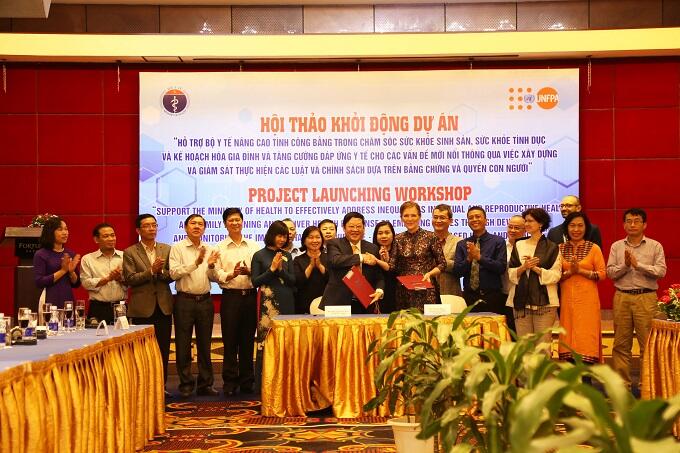HA NOI, 15/11/2017 – A new project between Viet Nam and the United Nations Population Fund (UNFPA) entitled "Support the Ministry of Health to effectively address inequalities in Sexual and Reproductive Health (SRH) and Family Planning (FP) and deliver health response to emerging issues through developing and monitoring the implementation of evidence and human right-based laws and policies" (VNM9P01), for the period 2017-2021, was launched today between the Ministry of Health and UNFPA in Viet Nam.
With the total budget of USD6.4 million for four years from 2017 to 2021, of which USD5.5 million is funded by UNFPA, the project aims to improve the quality of life of Vietnamese people through effective development and implementation of evidence-based policies on SRH, population/ FP. The project focuses on increasing universal access to and use of quality SRH and FP services, helping people make their own choices about their sexual and reproductive health, as well as effectively responding to urgent issues such as sex ratio at birth imbalance, and gender-based violence for all groups, especially disadvantaged, vulnerable people, and promoting gender equality in Viet Nam.
Addressing attendees at the event, Mr. Nguyen Viet Tien, Vice Minister of Health said: "Ministry of Health has been closely working together with UNFPA in the last 8 country programs to address issues related to the provision of SRH/FP services. In the 8th Country Program, the focus of cooperation between the Ministry of Health and UNFPA was relatively ambitious with an impressive budget. Despite some difficulties in the initial phase of implementation, the project was successfully implemented, making it a great contribution to the success of the 8th Country Program. The success of the project has also created a solid platform for the implementation of the National Strategy on Protection, Care and Improvement of People's Health".
Data from the 2009 census and other population change surveys show that Viet Nam has achieved most MDGs, including the MDG5 on reducing maternal mortality. However, while achievements must be sustained, wide disparities and inequities in access to and utilization of sexual and reproductive health services between urban and rural areas, geographical zones and vulnerable groups still remain and need to be strongly addressed in the national sustainable development goals. Therefore, the project's focus now is more ambitious than ever as we aim to transform our world by 2030 with the ultimate goal of achieving the SDGs and leaving absolutely no one behind.
Ms. Astrid Bant, UNFPA Representative in Viet Nam said: "UNFPA stands committed to support the Government of Viet Nam in achieving this vision of universal access to an integrated package of quality sexual and reproductive health services in every commune and district of the country. In addition, a united and multi-sectoral approach must be taken on healthcare issues, which involves a strong partnership between the public and private sector as well as civil society organizations ".
The project expects to achieve the following outputs:
- Improved national policy environment to conduct participatory and evidence-based advocacy for rights-based national laws, policies and programs on adolescents and youth development issues;
- Enhanced policy environment to prevent gender-based violence and harmful practices and enable the delivery of multisectoral services;
- Strengthened evidence base to address inequality in policy advocacy on population and development, climate change, sexual and reproductive health and reproductive rights;
- Improved policy environment to integrate population dynamics and health and social data into policies and programs to advance human rights, redress inequalities and achieve equitable sustainable development goals.
For further information, please contact:
Ms. Nguyen Thi Hong Thanh
UN Communications
Mob: 0913093363
Email: tnguyen@unfpa.org



